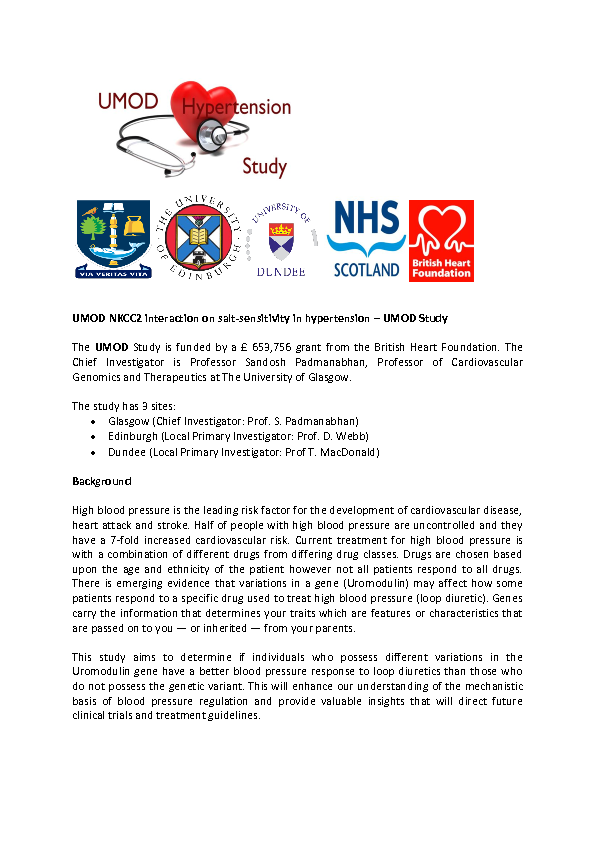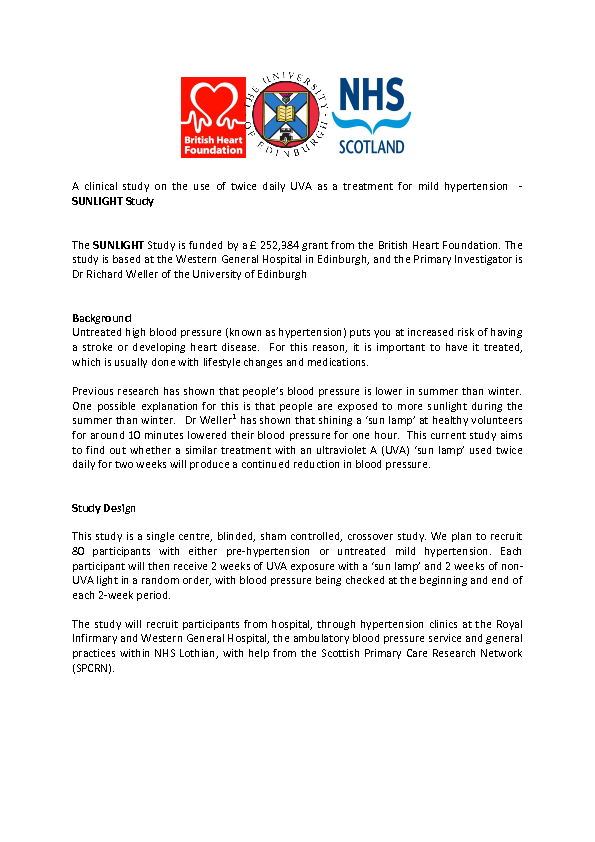Research
Research being undertaken by the department.

Support our research
Why take part in research?
We still don’t have a perfect treatment for high blood pressure and high cholesterol. In order to get closer to this goal we need to understand how different medicines work in different people. Taking part in research helps us to answer important questions about the treatment of high blood pressure and high cholesterol. This might even mean that in the future we’ll be able to offer tailored treatment for individual patients, also called personalized medicine.
Pros to taking part in research
- Contribute to the advancement of science
- Play an active part in your own healthcare
- Access treatments which are not yet widely available
- More attention from healthcare professionals, such as increased monitoring if you are taking part in a trial
- More time to ask questions
Cons to taking part in research
- You may have to give up your personal time
- May have to fill out lengthy forms or questionnaires
- Unforeseen side effects of study medication
- You may receive a placebo (dummy) treatment rather than the study drug
- Frustration at not knowing which treatment group you’re assigned to
Research studies
Studies currently ongoing are listed below, with more information on each in the documents below.
PATH-BP
A study of the effects of paracetamol on blood pressure.
UMOD
A study to see if some patients testing positive for a particular gene respond better to a group of medicines called Loop Diuretics.
SUNLIGHT
A study to see if twice daily UVA light treatment can be used to treat mild hypertension.
Take part
Express your interest in taking part in our research.
Recent research publication list
- Williams B, MacDonald TM, Morant SV, Webb DJ, et al. British Hypertension Society programme of Prevention And Treatment of Hypertension With Algorithm based Therapy (PATHWAY) Study Group. Endocrine and haemodynamic changes in resistant hypertension, and blood pressure responses to spironolactone or amiloride: the PATHWAY-2 mechanisms substudies. Lancet Diabetes Endocrinol 2018 (in press)
- MacDonald TM, Williams B, Webb DJ, et al. British Hypertension Society Programme of Prevention And Treatment of Hypertension With Algorithm‐based Therapy (PATHWAY). Combination therapy is superior to sequential monotherapy for the initial treatment of hypertension: a double-blind randomized controlled trial. J Am Heart Assoc 2017;6:e006986.
- Jenks SJ, Conway BR, McLachlan S, Teoh WL, Williamson RM, Webb DJ, Welsh P, Sattar N, Strachan MWJ, Price JF. Cardiovascular disease biomarkers are associated with declining renal function in older people with type 2 diabetes. Diabetologia 2017;60:1400-8.
- Hunter RW, Moorhouse R, Farrah TE, MacIntyre IM, Asai T, Gallagher PJ, Kerr D, Melville V, Czopek A, Morrison EE, Ivy JR, Dear JW, Bailey MA, Goddard J, Webb DJ, Dhaun N. First-in-man demonstration of direct endothelin-mediated natriuresis and diuresis. Hypertension2017;70:192-200.
- Balmforth C, van Bragt JMH, Ruijs T, Cameron JR, Kimmitt R, Moorhouse R, Czopek A, Hu MK, Gallacher PJ, Dear JW, Borooah S, MacIntyre IM, Pearson TMC, Willox L, Talwar D, Tafflet M, Roubeix C, Sennlaub F, Chandran S, Dhillon B, Webb DJ, Dhaun N. Chorioretinal thinning in chronic kidney disease links to inflammation and endothelial dysfunction. J Clin Invest Insight2016;1:e89173.
- Ivy JR, Oosthuyzen W, Peltz TS, Howarth AR, Hunter RW, Dhaun N, Al-Dujaili EAS, Webb DJ, Dear JW, Flatman PW, Bailey MA. Glucocorticoids induce nondipping blood pressure by activating the thiazide-sensitive cotransporter. Hypertension 2016;67:1029-37.
- Brown MJ, Williams B, Morant SV, Webb DJ, et al. British Hypertension Society's Prevention; Treatment of Hypertension with Algorithm-based Therapy (PATHWAY) Studies Group.Effect of amiloride, or amiloride plus hydrochlorothiazide, versus hydrochlorothiazide on glucose tolerance and blood pressure (PATHWAY-3): a parallel-group, double-blind randomised phase 4 trial. Lancet Diabetes Endocrinol 2016;4:136-47.
- Williams B, MacDonald TM, Morant S, Webb DJ, et al. British Hypertension Society’s PATHWAY Studies Group. Spironolactone versus placebo, bisoprolol, and doxazosin to determine the optimal treatment for drug-resistant hypertension (PATHWAY-2): a randomised, double-blind, crossover trial. Lancet 2015;386:2059-68.
- Dhaun N, Moorhouse R, MacIntyre IM, Melville V, Oosthuyzen W, Kimmitt RA, Brown KE, Kennedy ED, Goddard J, Webb DJ. Diurnal variation in blood pressure and arterial stiffness in chronic kidney disease: the role of endothelin-1. Hypertension 2014;64:296-304.
- Lenoir O, Milon M, Virsolvy A, Hénique C, Schmitt A, Massé J-M, Kotelevtsev Y, Yanagisawa M, Webb DJ, Richard S, Tharaux P-L. Direct action of endothelin-1 on podocytes promotes diabetic glomerulosclerosis. J Am Soc Nephrol 2014;25:1050-62.
- Ben-Shlomo Y, et al. Aortic pulse wave velocity improves cardiovascular event prediction: an individual participant meta-analysis of prospective observational data from 17,635 subjects. J Am Coll Cardiol 2014;63:636-646
- Wiseman S, Marlborough F, Doubal F, Webb DJ, Wardlaw J. Blood markers of coagulation, fibrinolysis, endothelial dysfunction and inflammation in lacunar stroke versus non-lacunar stroke and non-stroke: systematic review and meta-analysis. Cerebrovasc Dis 2013;37:64-75.
- Lilitkarntakul P, Dhaun N, Melville V, Kerr D, Webb DJ, Goddard J. Risk factors for metabolic syndrome independently predict arterial stiffness and endothelial dysfunction in patients with chronic kidney disease and minimal comorbidity. Diabetes Care 2012;35:1774-80.
- Dhaun N, Macintyre IM, Kerr D, Melville V, Johnston NR, Haughie S, Goddard J, Webb DJ. Selective endothelin-A receptor antagonism reduces proteinuria, blood pressure, and arterial stiffness in chronic proteinuric kidney disease. Hypertension 2011;57:772-9.
- Payne RA, Lilitkarntakul P, Dhaun N, Melville V, Asai T, Goddard J, Webb DJ. Renal dysfunction does not affect the peripheral-to-central arterial pressure transfer function. Hypertension2010;56:1083-8.
- Study of the Effectiveness of Additional Reductions in Cholesterol and Homocysteine (SEARCH) Research Collaborative Group. Intensive lowering of LDL cholesterol with 80 mg versus 20 mg simvastatin daily in 12064 survivors of myocardial infarction: a double-blind randomised trial.Lancet 2010;376:1658-69.
- Oliver JJ, Dear JW, Webb DJ. Clinical potential of combined organic nitrate and phosphodiesterase type 5 inhibitor in treatment-resistant hypertension. Hypertension 2010;56:62-7.
- The ASTRAL Investigators. Revascularization versus medical therapy for renal-artery stenosis. N Engl J Med 2009;361:1953-62.
- Dhaun N, Macintyre IM, Melville V, Lilitkarntakul P, Johnston NR, Goddard J, Webb DJ. Blood pressure-independent reduction in proteinuria and arterial stiffness after acute endothelin-A receptor antagonism in chronic kidney disease. Hypertension 2009;54:113-9.
- Langrish JP, Mills NL, Bath LE, Warner P, Webb DJ, et al. Cardiovascular effects of physiological and standard sex steroid replacement regimens in premature ovarian failure. Hypertension2009;53:805-11.




